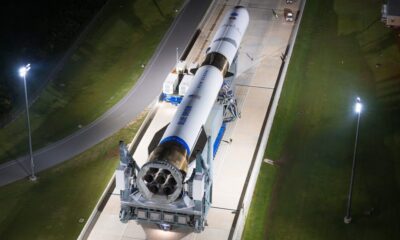Education
Computer Science Graduates Navigating Uncertain Job Market Amid AI Disruption

The job market for computer science graduates is undergoing significant changes as automation, particularly driven by artificial intelligence, alters the landscape of entry-level roles. Once considered a reliable pathway to lucrative positions in technology, the demand for software engineers and developers has shifted dramatically since the tech boom of 2020 to 2022. New graduates are now facing a complex environment where opportunities are dwindling.
According to Professor James O’Brien from the University of California, Berkeley, the pressure on recent graduates has intensified. In a recent interview with CTV Your Morning, he highlighted that many entry-level jobs, which typically required basic skills, are increasingly being automated. “The entry level jobs, … work that maybe wasn’t the most complicated work or the most difficult … are increasingly being automated,” O’Brien stated. This automation trend has contributed to a decline in available positions for new entrants in the field.
O’Brien noted that in some organizations, artificial intelligence now generates at least 20 percent of the code, a figure that may rise in the future. He cautioned that the trend of AI replacing jobs is not confined to the tech sector. “We’re going to see in computer science something that we see happening in other fields as well,” he explained. “Those jobs are also going to start to get automated by AI, and as they go away, we’re going to see growing unemployment, not just in computer science, but probably really across the board.”
The automation of entry-level roles is a global issue, as O’Brien pointed out, with similar declines in hiring for computer science graduates occurring in regions such as India. He emphasized that the critical concern is not merely the outsourcing of jobs but the rapid advancement of automation technologies. “It depends a little bit on what you think is going to happen with the evolution of the technology we have today,” he said. His perspective suggests an ongoing trajectory of technological advancement that may further disrupt traditional roles.
Despite these challenges, O’Brien remains optimistic about the future of computer science education. He encourages students to move beyond merely acquiring low-level coding skills. “I would encourage students (to not) just focus on learning low-level skills, like how to write code in a particular language, but instead focus on learning the higher-level concepts,” he advised. He believes that aspects of software development that involve creative thinking and problem-solving will continue to require human insight, distinguishing those skills from the more mechanical aspects of coding.
In conclusion, computer science graduates are navigating a rapidly evolving job market where automation is reshaping entry-level opportunities. The emphasis on higher-level skills may provide a pathway for students to remain competitive in a landscape increasingly dominated by artificial intelligence. As the industry continues to adapt, the focus for future graduates will need to shift towards innovation and strategic thinking, allowing them to thrive alongside advancing technologies.
-

 Politics4 weeks ago
Politics4 weeks agoSecwepemc First Nation Seeks Aboriginal Title Over Kamloops Area
-

 World5 months ago
World5 months agoScientists Unearth Ancient Antarctic Ice to Unlock Climate Secrets
-

 Entertainment5 months ago
Entertainment5 months agoTrump and McCormick to Announce $70 Billion Energy Investments
-

 Science5 months ago
Science5 months agoFour Astronauts Return to Earth After International Space Station Mission
-

 Lifestyle5 months ago
Lifestyle5 months agoTransLink Launches Food Truck Program to Boost Revenue in Vancouver
-

 Technology3 months ago
Technology3 months agoApple Notes Enhances Functionality with Markdown Support in macOS 26
-

 Lifestyle3 months ago
Lifestyle3 months agoManitoba’s Burger Champion Shines Again Amid Dining Innovations
-

 Top Stories2 months ago
Top Stories2 months agoUrgent Update: Fatal Crash on Highway 99 Claims Life of Pitt Meadows Man
-

 Politics4 months ago
Politics4 months agoUkrainian Tennis Star Elina Svitolina Faces Death Threats Online
-

 Sports5 months ago
Sports5 months agoSearch Underway for Missing Hunter Amid Hokkaido Bear Emergency
-

 Politics5 months ago
Politics5 months agoCarney Engages First Nations Leaders at Development Law Summit
-

 Technology5 months ago
Technology5 months agoFrosthaven Launches Early Access on July 31, 2025





















